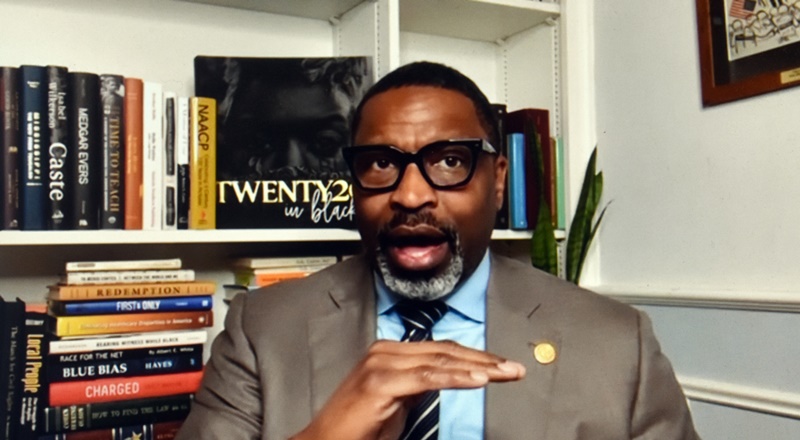NAACP president says trial over George Floyd death represents ‘inflection point’ for criminal justice

NAACP President and CEO Derrick Johnson makes a point about the criminal justice system. Photo: Alan Kotok
NAACP President and CEO Derrick Johnson said the trial in Minneapolis over the death of George Floyd represents an “inflection point” in the country’s criminal justice system. He spoke during a virtual Newsmaker event at the National Press Club on Wednesday.
Former Minneapolis police officer Derek Chauvin is charged with killing Floyd last summer, an incident caught on camera that inspired nationwide protests for racial and social justice.
Johnson said those protests came because of “pent-up frustration and fear” after former President Trump's “sowing seeds of hate and division,” but he said the public must be prepared for a verdict that is “less than just.”
“What’s on trial is our criminal justice system,” Johnson said. “What’s on trial is the right for a Black man to breathe in America. What’s on trial is the right for a Black man to go through a process where there is due process, and law enforcement are not coming on the scene and trying to convict and punish to death based on some level of assumptions.”
Floyd’s death evoked discussions about police reform and the relationships between law enforcement and the communities they serve, and while many agencies do get it right, those that do not need more accountability, Johnson said.
And while he rejected the “defund the police” rhetoric, officers need more training in how to de-escalate situations, Johnson said. There needs to be more financial resources for mental health support, social workers and programs for young people, many of which have been cut as law enforcement budgets have swelled, he continued. Reform in all those areas, including the police, can help society, he said.
"I don’t know what ‘defund the police’ means, and what context and under what theory,” Johnson said. “But police reform is important.”
The Black Lives Matter movement also took on a more prominent role during last summer’s protests, leading some to ask if the NAACP still has a role in promoting civil rights, or if it had been left behind by younger generations. Johnson said calls for social and racial justice are not an “us vs. us proposition,” however, and said all groups have a role to play in shaping the future.
“Social justice isn’t a competition,” Johnson said. “It’s an opportunity for people to add their voices to the conversation.”
Johnson spoke days after the 52nd NAACP Image Awards, which honor outstanding performances in entertainment and the arts. Like many areas of society, the media and entertainment industries have come under scrutiny for a lack of diversity, something Johnson said is “so pervasive” and must change. Black people's better representation in the media, will help highlight excellence and change negative perceptions, he said.
“We recognize how people see us on the screen is how we are treated in public policy, how we are treated in the streets, and how the perceptions of other communities relate to African-Americans,” Johnson said.
